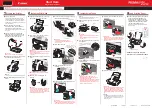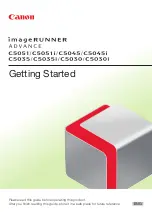
7. TROUBLESHOOTING
7.1 Outline of Troubleshooting
7.1.1 Outline
There are two types of trouble: trouble which is reported by the messages indicated on
the message display, including "operator call," "warning," "error," and "firmware
error"; and trouble not indicated on the message display.
"Operator call" is a two-line message which asks the user to take action to solve the
problem shown on the printer's message display. In this manual, a colon (:) is used to
distinguish the first and second lines of the message.
The alphanumeric code indicating the type of error, that is the "warning", "error," or
"firmware error," will be displayed on the printer's -message display. The letters at the
end of the code indicates the following: W for the "warning," E for the "error," and B
for the "firmware error."
See
Part 3: 5.3 Error Indications (Page 3-66)
for a list of the problems which can be
detailed on the message display.
7.1.2 Notice for Troubleshooting
1. Obtain information about the system environment and the type of paper used for
printing.
2. Before performing troubleshooting, make sure that all cables are connected
properly.
3. When servicing the printer with the external cover is removed and the AC power
connected, pay special attention when handling the electrical parts or the boards to
avoid an electric shock or short circuit.
4. In the following sections, the troubleshooting steps (action) are described such that
the component related to the most probable cause of the problem will be repaired
or replaced first, following by components with less failure probability. If multiple
components are the same probability of predicted failure, the steps are indicated
based on how easy the servicing is.
After performing a step, check to see if the problem has been solved by executing a
test print. If not resolved, proceed with the next step.
5. When "Warning," "Error," or "Firmware Error" is reported, it is possible to enter the
service mode while the code is shown on the message display (Wxxxx, Exxxx, or
Bxxxx). See
Part 3: 5.2 Service Mode (Page 3-55)
for more information.
6. When the service has been completed, check to ensure that all connectors/cables
are reinstalled and screws are firmly tightened.
7. After performing replacement or repair services, run test prints to check whether
the problem has been solved.
Part 5: Maintenance
BJ-W9000
5-48
Summary of Contents for BJ-W9000
Page 2: ...0201 GR 0 35 0 ...
Page 3: ......
Page 20: ...This page is intentionaly left blank ...
Page 131: ...3 81 BJ W9000 Part 3 Operations This page intentionally left blank ...
Page 143: ...4 5 BJ W9000 Part 4 Technical Reference This page intentionally left blank ...
Page 199: ...4 61 Part 4 Technical Reference BJ W9000 This page intentionally left blank ...
Page 251: ...5 31 BJ W9000 Part 5 Maintenance This page intentionally left blank ...
Page 359: ...5 139 BJ W9000 Part 5 Maintenance This page intentionally left blank ...
Page 420: ...SERVICE MANUAL ...
Page 440: ...Page 4 1 1 OPERATION OVERVIEW OVER Part 4 OPERATION VIEW ...
Page 452: ...Page A 1 1 CIRCUIT DIAGRAM A 2 2 LOCATION OF ELECTRICAL COMPONENT ON THE PCB Part 6 APPENDIX ...
Page 455: ...This document is printed on 100 recycled paper PRINTED IN JAPAN IMPRIME AU JAPON CANON INC ...
















































